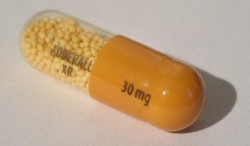
As some of the most powerful psychoactive agents on the market, amphetamines speed up most every bodily process regulated by the brain and central nervous system. Normally prescribed to treat conditions involving ADHD and narcolepsy symptoms, these drugs can cause widespread damage to the brain and body when used for non-medical purposes.
People who abuse amphetamines on an ongoing basis remain at high risk of developing amphetamine psychosis. Much like the name implies, symptoms associated with amphetamine psychosis closely resemble those brought on by full-blown psychosis disorders.
The duration of amphetamine psychosis can vary depending on user tolerance levels as well as whether a history of psychological disorder exists. With continued drug abuse, amphetamine psychosis may well turn into long-term brain damage, though the presence of psychotic-like symptoms indicates some degree of damage has already taken place.
Amphetamine Psychosis Symptoms
According to the National Alliance on Mental Health, psychotic-type symptoms represent a break with reality in one form or another. Much like the withdrawal symptoms that come with frequent amphetamine abuse, long-term and/or chronic amphetamine use can cause psychotic symptoms to develop, some of which include:

Abusing adderall or a similar drug can lead to amphetamine psychosis.
- Visual/auditory/tactile hallucinations
- Paranoia
- Hostility
- Rage
- Delusions
- Thoughts of suicide
- Incoherent speech
In essence, amphetamine-induced psychosis results from the rampant brain chemical imbalances caused by the drug’s effects on brain function. Since the severity of symptoms can vary at different times, the more severe the symptoms, the greater the chemical imbalance.
With amphetamine abuse and addiction, these drugs cause ongoing damage to chemical-secreting brain cells, which in turn offsets the brain’s ability to maintain normal functioning. Weakening brain cells only works to aggravate drug-using behaviors as brain tolerance levels increase over time. By the time a person starts to display psychotic-type behaviors, the brain has already undergone a considerable degree of damage.
Types of Amphetamine Psychosis
According to Penn State University, the duration of amphetamine psychosis can vary depending on the type psychotic episode experienced. In general, there are two types:
- Transient
- Persistent
With transient psychosis, symptoms may only last for a few hours with some residual effects lasting for up to a week when detoxing off the drug. With persistent psychosis, symptoms can last for three months. When detoxing, symptoms can last for as long as six months after stopping drug use.
Ultimately, the degree of damage done to brain chemical functions determines how long a psychotic episode will last. For people with history of psychological disorders, chronic amphetamine use can trigger a full-blown psychosis that lasts indefinitely.
Factors Affecting Duration
Amphetamines exert a tremendous influence over dopamine neurotransmitter processes in the brain. Consequently, any factors known to influence dopamine secretion rates can increase a person’s risk of developing amphetamine psychosis, according to the U. S. National Library of Medicine.
Risk factors include:
- High-stress home environments
- A family history of schizophrenia
- Repeated exposures to social adversity
In effect, the more risk factors a person has the more likely he or she will experience psychotic episodes of longer durations.


